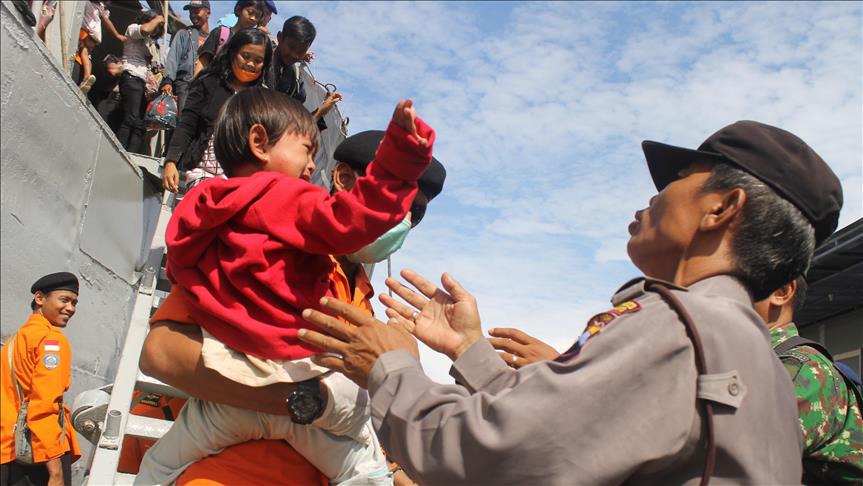Members of controversial Indonesian community return home
Members of Gafatar - accused of teachings that deviate from traditional Islam - shipped home from Borneo after local residents burned settlement

Jakarta Raya
By Ainur Rohmah
JAKARTA
Thousands of members of a religious organization accused of encouraging teachings that deviate from traditional Islam have arrived home destitute after being forced from the Indonesian island of Borneo.
Last week, the government was forced to repatriate members of Gerakan Fajar Nusantara -- known as Gafatar organization -- using aircraft and warships after local residents protested and burned their settlement in the Mempawah Regency of West Kalimantan.
Thousands of local residents had earlier taken to the streets to complain about the community after a doctor left the neighboring area to join the movement, followed by the disappearance of hundreds of other people.
Returning farmer Lustari -- many Indonesians use only one name -- told Anadolu Agency on Monday that he had sold everything to move with a group of other farmers to Borneo in an effort to improve his economic lot.
"Someone from Jakarta offered me a job working land in Mempawah... the land was leased. If had money, he said it could be bought," the 28-year-old said on arriving with his wife and children and hundreds of other people at a port in Semarang city, Central Java.
"But my hopes have been dashed. I've no more money left," said the Banyumas Regency resident.
Lustari's family were just one of the many who returned to Semarang Monday after an almost 40-hour journey by Tanjung Gili Warship. Hundreds of others were also repatriated to Jakarta, Surabaya and Medan after their camp was attacked.
As the day wore on, more than 300 members remained in the passenger terminal waiting to be dispatched by bus to temporary accommodation in a military barracks in Solo City, Central Java.
"The Mempawah citizens are good people, we do not know who attacked and burnt our camp," Lustari added.
Another returning Gafatar member said that three months ago, he had also given up his home in Wonosobo Regency to move to the camp to participate in farming.
"There, we were planting rice and vegetables. Actually, we were about to begin our harvest but with these events there will be no more harvest," Nanang Kosim told Anadolu Agency, his wife and 3-1/2-year-old daughter beside him.
"We are a group of farmers. We were taught how to farm. Our reason for joining the camp was economic, not ideological."
Gafatar -- founded by Ahmad Moshaddeq, who has spent time in prison on blasphemy charges -- is suspected of being the proxy for another organization that has been banned by the Indonesian government, Al-Qiyadah Al-Islamiyah.
Indonesia's Ulema Council (MUI) is in the process of investigating Gafatar's origins and activities in order to establish a fatwa (edict) on the organization.
"If it is true that it [Gafatar] is the reincarnation of Al-Qiyadah Al-Islamiyah, we will declare it as deviate," MUI's Chairman Ma'ruf Amin told reporters last week.
Al-Qiyadah Al-Islamiyah -- which brought together teachings from the Qur’an, the Bible, and the Torah -- was established in 2000, with Moshaddeq claiming to be a prophet or messiah following a revelation he claimed he received during 40 days of meditation on a mountain in West Java.
In 2008, the MUI declared Al-Qiyadah Al-Islamiyah a heretic organization, with Moshaddeq sentenced to four years in prison for religious defamation.
In Indonesia -- the world's most populous Muslim nation -- Gafatar can be considered deviant if its ideology is also proven to unify Islamic, Christian and Judaic teachings.
Gafatar, however, claims it is a social organization that focuses on blood donations, environmental cleaning actions and providing capital assistance to the poor.
Many of those returning Monday said they had no idea Gafatar was deviant, as they thought it had permission from the government.
"We were farming. There were also lectures and prayers. A Musala [a small mosque] was under construction," said Surahman, another farmer, who again said he had moved with the promise of being given land to farm.
"To my knowledge, this is a social organization that has permission," Budi, 35, told Anadolu Agency, standing with his wife and three children.
He said he was bankrupt and now had nowhere to go.
National police have said that around 2,816 people were living in the Gafatar camp in West Kalimantan.
On Monday, National Police Chief Badrodin Haiti underlined in front of parliament that the religion had deviated from Islamic teachings.
"Ahmad Moshaddeq had admitted as Gafatar's new prophet that there was no obligation to pray, fast, and so on," he said.
Anadolu Agency website contains only a portion of the news stories offered to subscribers in the AA News Broadcasting System (HAS), and in summarized form. Please contact us for subscription options.







